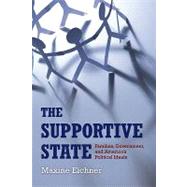The Supportive State Families, Government, and America's Political Ideals
, by Eichner, Maxine- ISBN: 9780195343212 | 0195343212
- Cover: Hardcover
- Copyright: 10/15/2010
There is broad agreement among politicians and policymakers that the family is a critical institution of American life. Yet the role that the state should play with respect to family ties among citizens remains deeply contested. This controversy over the state's role undergirds a broad range of public policy debates: Does the state have a responsibility to help resolve conflicts between work and family? Should same-sex marriage be permitted? Should the state encourage marriage and two-parent families? Should parents who receive welfare benefits be required to work? Yet while these individual policy issues are endlessly debated, the underlying theoretical question of the stance that the state should take with families remains largely unexplored. In The Supportive State: Families, Government, and America's Political Ideals , Maxine Eichner argues that government must take an active role in supporting families. She contends that the respect for human dignity at the root of America's liberal democratic understanding of itself requires that the state not only support individual freedom and equality--the goods generally considered as grounds for state action in liberal accounts. It must also support families, because it is through families that the caretaking and human development needs which must be satisfied in any flourishing society are largely met. Families' capacity to satisfy these needs, she demonstrates, is critically affected by the framework of societal institutions in which they function. In the "supportive state" model she develops, the state bears the responsibility for structuring societal institutions to support families in performing their caretaking and human development functions. Meanwhile, families bear responsibility for the day-to-day caring for (or arranging the care for) family members with dependency needs. In this model, supporting families is as central to the responsibilities of the state as ensuring a competent police force to ensure citizens' safety. Although not all family forms will further the important functions that warrant state support, she argues that a broad range will. Her vigorous defense of the state's responsibility to enhance families' capacity for caretaking and human development stands as a sharp rejoinder to the widespread conservative belief that the state's role in family life must be diminished in order for families to flourish.







